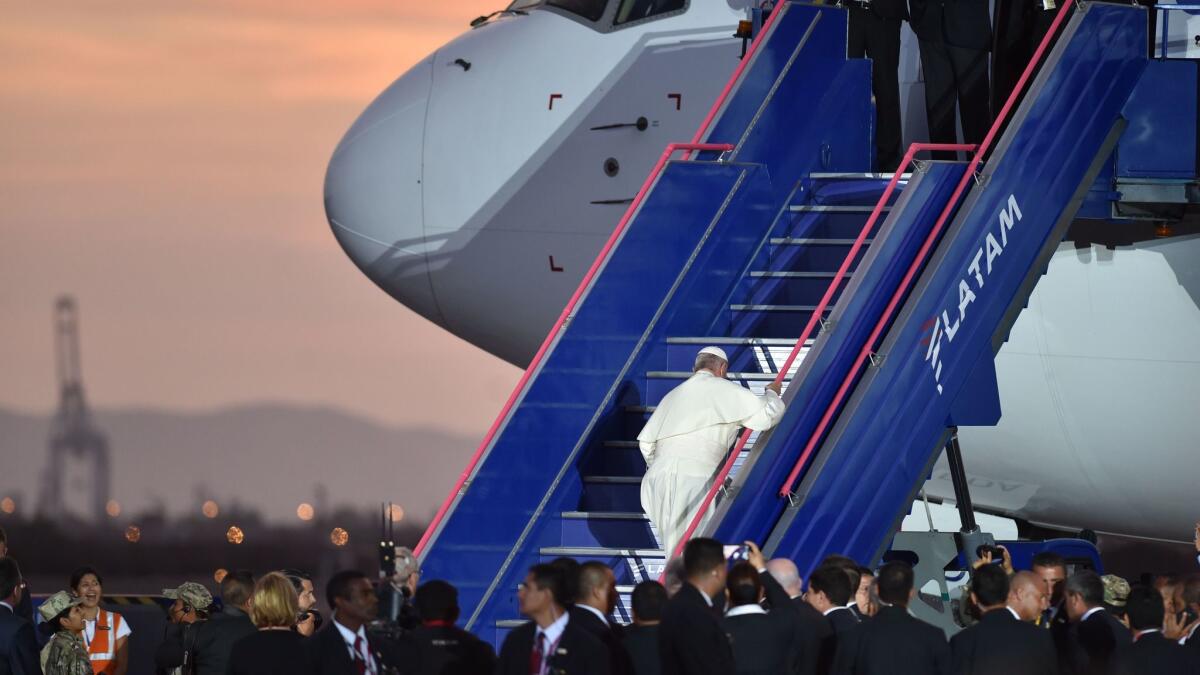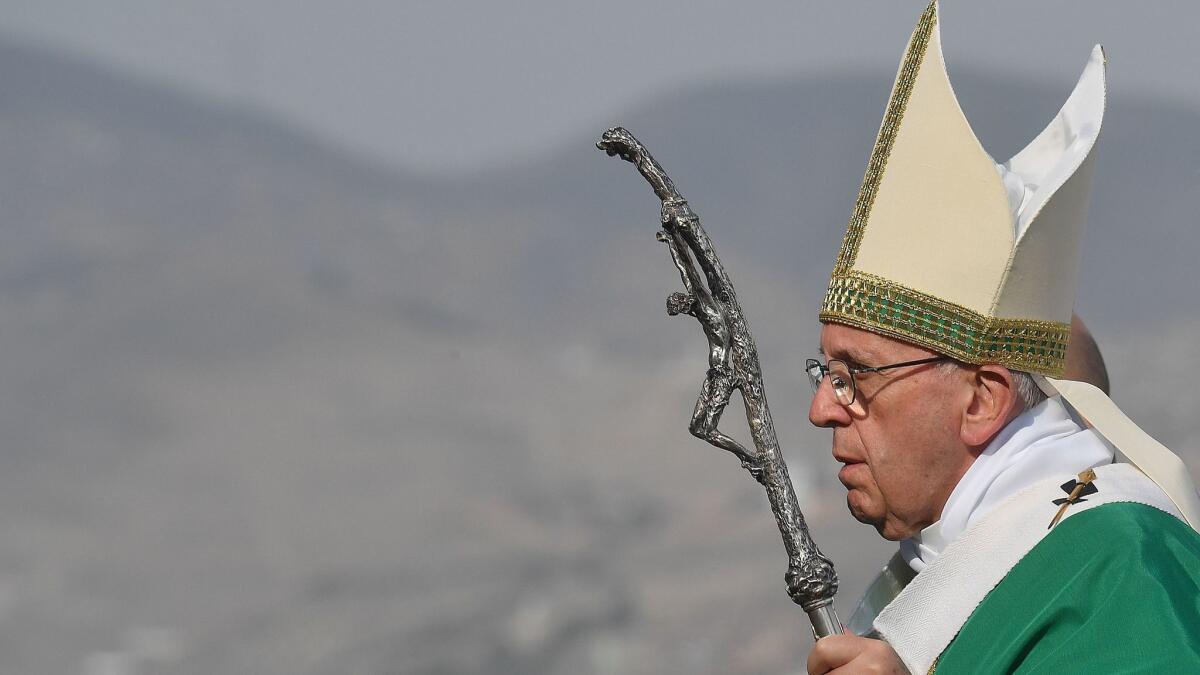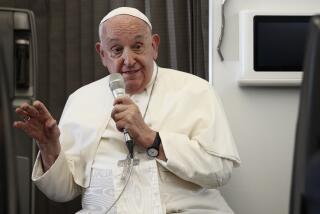Pope ends South American trip, laments state of urban poor

Reporting from Lima, Peru — Pope Francis ended his trip to Chile and Peru on Sunday with a warning about the plight of the urban poor and what he termed the “globalization of indifference” toward their fate.
“They are found along our roadsides, living on the fringes of our cities, and lacking the conditions needed for a dignified existence,” Francis said in a final homily before an estimated 1 million worshipers at a Mass at an air base here. “It is painful to realize that among these ‘urban remnants’ all too often we see the faces of children and adolescents. We look at the face of the future.”
The comments were in line with Francis’ oft-expressed concern for what he has termed a consumer-driven “throwaway culture” that, the pope says, devalues lives and the environment.
Throughout his six-day swing through the two South American nations, the pope emphasized the plight of the young and the poor, and denounced violence against women.

During a visit to the Peruvian Amazon city of Puerto Maldonado, Francis condemned forced prostitution and human trafficking, lamenting the fact that women were being “devalued, denigrated and exposed to endless violence.”
The issue of clergy sexual abuse — which was a prominent and controversial theme during the first days of his trip, in Chile — did not come up publicly during his days in Peru.
Some activists here had called on the pope to address allegations of abuse surrounding a Catholic organization known as Sodalitium Christianae Vitae. The group’s former leader, Luis Fernando Figari, who is Peruvian, has denied accusations of years of sexual abuse of young men. But the pope did not address the case.
Francis had caused a furor with comments in Chile suggesting that victims of sexual abuse were committing slander by accusing a Chilean bishop of covering up misconduct by that country’s most notorious pedophile priest. The bishop has denied any wrongdoing in the case. The Vatican sentenced the pedophile priest to a life of reflection and prayer.
On Saturday, Cardinal Sean O’Malley — the archbishop of Boston and Francis’ top aide on the issue of clerical abuse — sought to soothe the indignation arising from the pope’s comments in Chile.
In a statement, the cardinal acknowledged that the pope’s words “were a source of great pain for survivors of sexual abuse.” But the cardinal added that Francis “fully recognizes the egregious failures of the church and its clergy who abused children.”
Indeed, Francis had issued a strong apology for clerical sexual abuse during his visit to Chile.
The pope and his entourage boarded a flight for Rome shortly before 7 p.m., just as dusk was falling.
The pontiff — who assumed the papacy in March 2013, becoming the first pope from the Americas — concluded his 22nd apostolic visit abroad. He has visited 32 nations.
Earlier Sunday, at a meeting with Peruvian bishops, the Argentine-born pope ventured into the thorny realm of politics in his native continent, where corruption scandals have rocked a number of nations, notably Peru. The pope expressed extreme pessimism about the state of regional politics.
“Of course there are exceptions, but in general the politics in Latin America is more ill than well,” Francis told Peruvian bishops gathered at the headquarters of the archdiocese of Lima. “The crisis is not just [in] Peru, it’s a problem that Latin America suffers, a great lack of confidence.”
Especially troubling, he noted, was the tumultuous political panorama in Peru, where corruption charges have tainted the terms of several former presidents and almost resulted in the impeachment last year of the current president, Pedro Pablo Kuczynski.
“What is going on in Peru that every time a president leaves they put him in prison?” Francis asked the bishops, referring to corruption cases against several prior presidents.
Kuczynski, who met with the pope several times during his visit here — including a meeting at the airport on Sunday just before Francis departed — narrowly avoided impeachment in December on corruption allegations that he denied.
But Kuczynski subsequently pardoned another ex-president, Alberto Fujimori, who had served less than half of a 25-year sentence for human rights abuses and corruption. The pardon was widely viewed in Peru as a political deal arranged with pro-Fujimori lawmakers to avert Kuczynski’s ouster.
The pope, who repeatedly denounced violence during his trip, also took a swipe at the region’s jails and prisons, which are often over-crowded and subject to corruption and gang rule.
“What is going on with the prisons?” Francis asked. “They are overpopulated, [inmates] live like animals. It is the school of corruption.”
During an address at Lima’s central square, Francis urged discouraged youth not to lose hope as though they were “being left out of the World Cup,” a reference to the world soccer championship held every four years. Francis has regularly reached out to young people.
In a reference to technology and social media, Francis advised the young that they could not “photo-shop” their hearts.
During the Lima address, the pope also called for a moment of silence and reflection for people killed and injured during church-backed demonstrations in the Republic of Congo.
On a lighter note, the pope addressed a group of 500 nuns and likened “the gossiping nun” to a “terrorist,” adding: “Gossip is like a bomb.”
ALSO
Pope Francis, in Peru, speaks of threats to native Amazonian people and the rainforest
Pope Francis urges compassion toward immigrants, those ‘who have had to leave everything behind’
At the busiest airport in South America, a cat-and-mouse game to catch cocaine smugglers
Special correspondents Adriana Leon and Liliana Nieto del Rio contributed to this report.
Twitter: @PmcdonnellLAT
More to Read
Sign up for Essential California
The most important California stories and recommendations in your inbox every morning.
You may occasionally receive promotional content from the Los Angeles Times.









